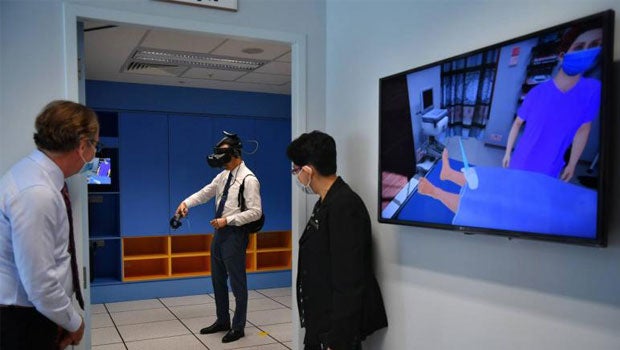
Senior Minister of State for Health Koh Poh Koon (centre) trying out the acute care VR game. With him are Duke-NUS dean Thomas Coffman (left) and Professor Fatimah Lateef, co-director of the new institute. ST PHOTO: CHONG JUN LIANG
SINGAPORE - A simulation training facility has been set up by SingHealth and Duke-NUS to hone and improve the skills of healthcare professionals with the help of serious games.
Known as the SingHealth Duke-NUS Institute of Medical Simulation (Sims) i3 Hub, the facility in Academia, in College Road, opened on Tuesday (Jan 18). It houses a wide range of extended-reality solutions – immersive technologies that can merge the physical and virtual worlds – and gaming equipment to facilitate learning.
Professor Chan Choong Meng, the group chief education officer of SingHealth, said on Tuesday: "A key benefit of incorporating serious games in healthcare training is the ability to simulate challenging scenarios for learners to practise critical thinking, decision-making and hone practical skills in a safe learning environment."
Senior Minister of State for Health Koh Poh Koon said in his opening remarks that the incorporation of serious games in teaching enhances "the breadth of healthcare simulation capabilities", thereby offering more engaging and interactive learning opportunities which empower healthcare professionals to take increased ownership of their learning.
He noted that the Sims hub has developed 18 serious games that cover a wide variety of skills and knowledge across various healthcare professions.
Professor Fatimah Lateef, co-director of the SingHealth Duke-NUS Institute, said that the hub is currently open to healthcare professionals from KK Women’s and Children’s Hospital, Sengkang General Hospital, Singapore General Hospital and Changi General Hospital, all run by SingHealth.
She added that the games fulfil unmet training needs among healthcare professionals.
One game, known as the Basic Cardiac Life Support Game, teaches learners to perform cardiopulmonary resuscitation (CPR) and identify people who need it. The game allows healthcare professionals to refresh their CPR knowledge and skills remotely.
Developed by SingHealth Alice Lee Institute of Advanced Nursing, the game will be integrated into SingHealth's basic cardiac life support certification training this year. Up to 5,000 healthcare professionals are expected to be trained with this game in a year.
With these games, the duration for in-person, hands-on training is projected to reduce by around 25 per cent, saving on manpower and cost.
Another game, developed by the Singapore General Hospital's department of internal medicine, aims to train healthcare professionals to manage septic shock.
Septic shock is a life-threatening condition usually caused by bacterial infection and can lead to the patient's blood pressure dropping to a dangerously low level.
The game recreates such scenarios through virtual reality for doctors to practise critical decision-making without posing a risk to actual patients.
Examples of other games include one that teaches users how to dispense medicine in the pharmacy properly, one on magnetic resonance imaging (MRI) safety and another that allows users to play the role of a decontamination team member responding to a disaster.
Prof Lateef said that games in the pipeline include one on paediatric crisis management catered to non-paediatricians, and one aimed at teaching nurses to deliver fluids, nutrients and medications via an infusion pump.
To support the proliferation of serious games in healthcare education, Sims has collaborated with game developer Serious Games Asia to create a one-stop integrated platform that can host serious games for up to 5,000 players at any one time.
Called the Healthcare-Training and Assessment Hosting Platform, the software also collates data across the games in a central repository, which will offer healthcare educators useful insights into learning gaps and also spark new ideas for the development of more games.













 Get it on Google Play
Get it on Google Play